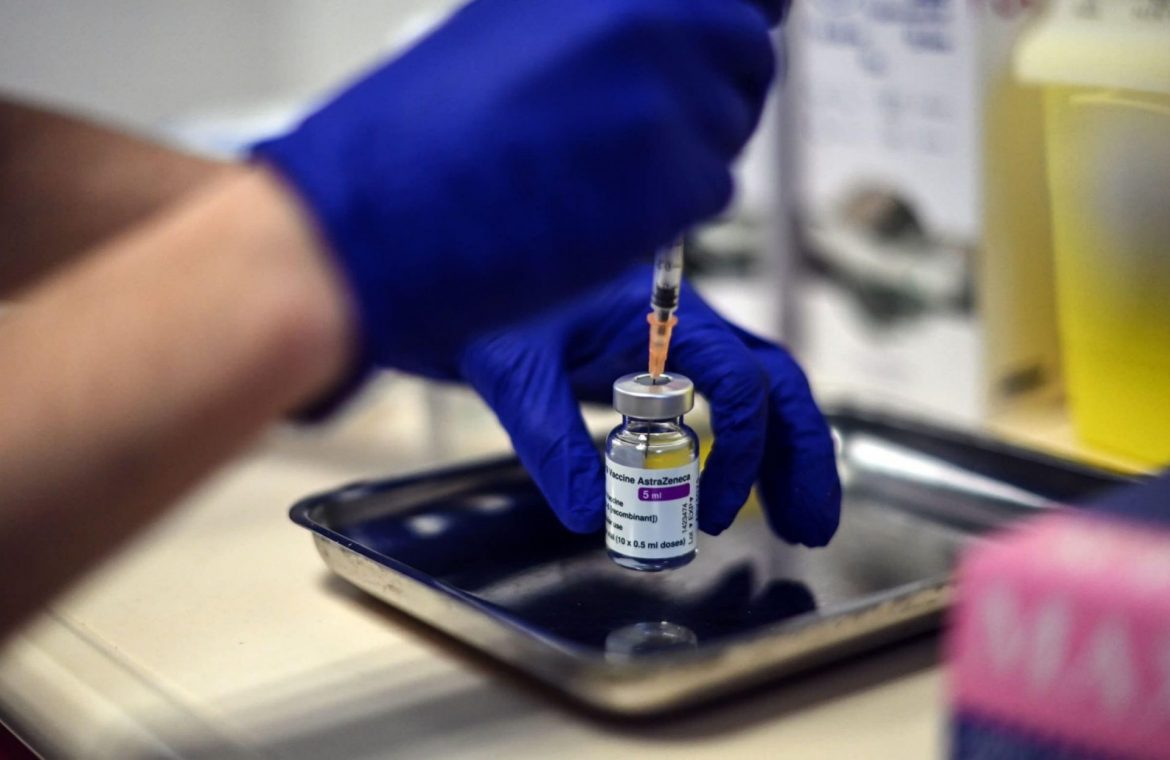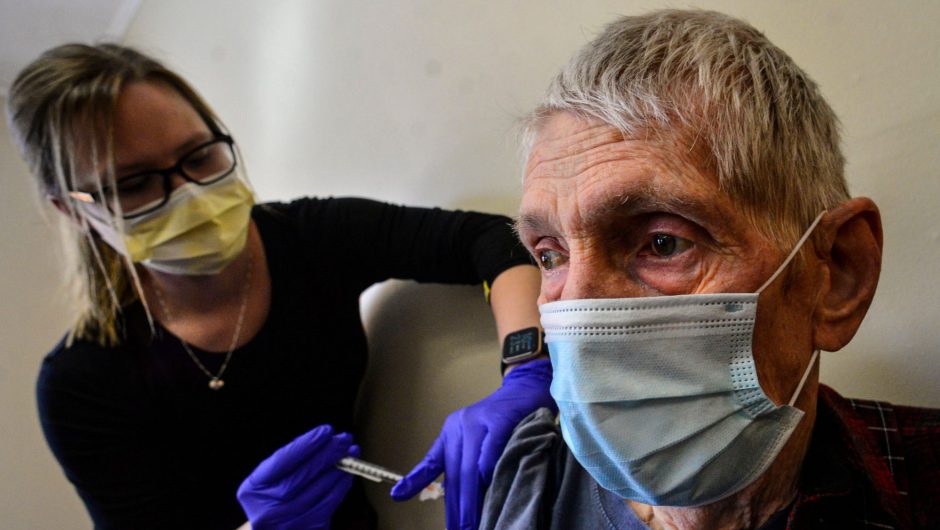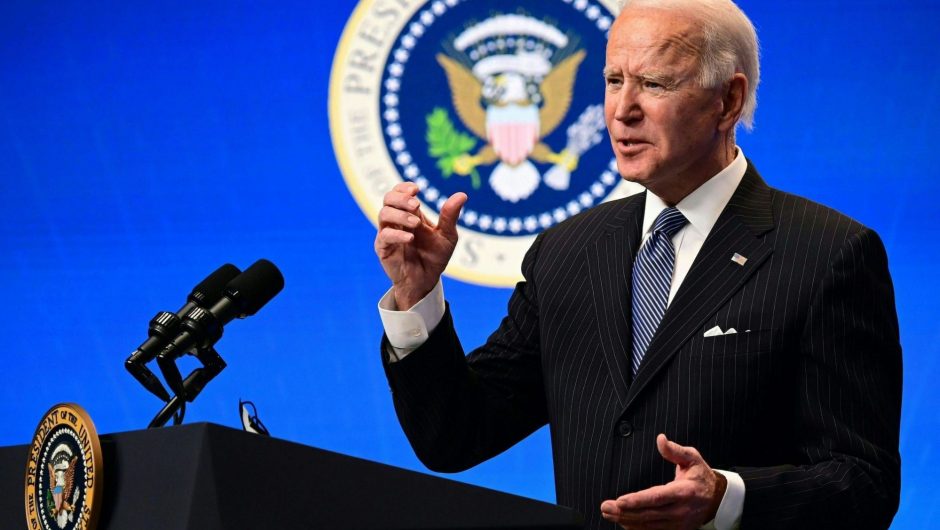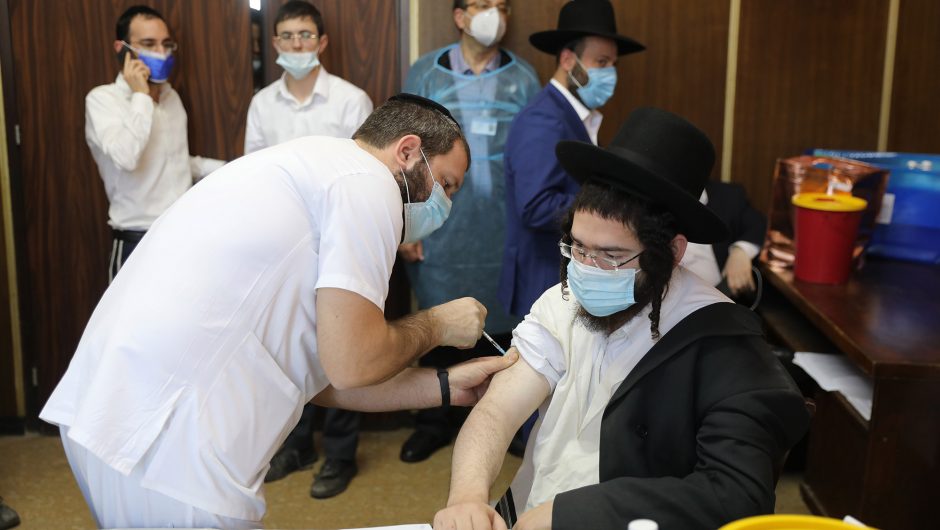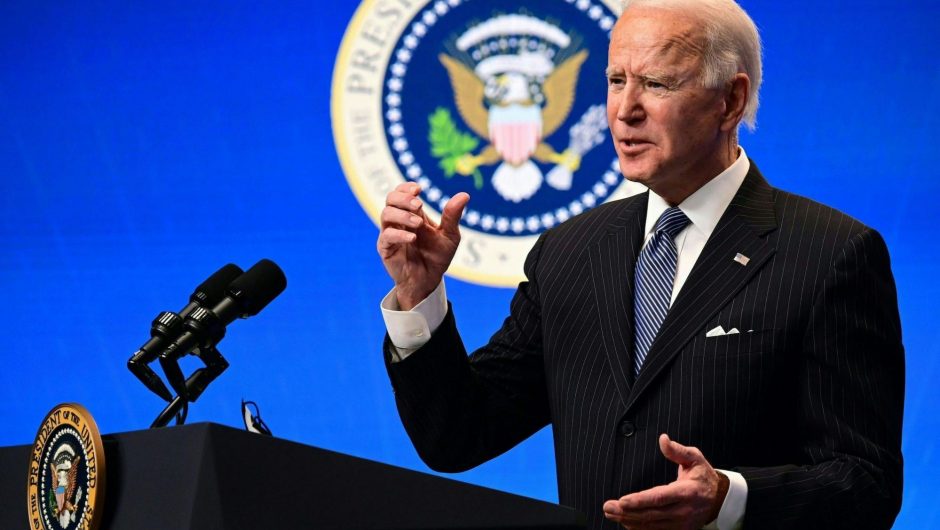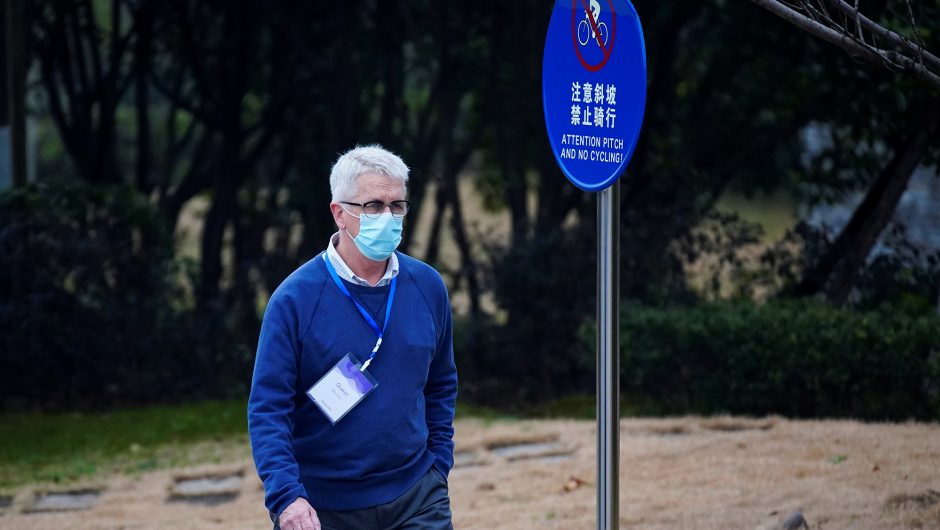The Oxford vaccine was less effective against the South Africa strain in phase I and II trials – EPA
AstraZeneca says its vaccine developed with the University of Oxford appeared to offer only limited protection against mild disease caused by the variant of Covid-19 first discovered in South Africa, based on early data from a trial.
The study from South Africa’s University of the Witwatersrand and Oxford University analysed the E484K mutation in some 2,000 people, most of whom were young and healthy.
The team found that the vaccine had reduced efficacy against the South African variant, according to a Financial Times report.
Among coronavirus variants currently most concerning for scientists and public health experts are the Kent, South African and Brazilian variants, which appear to spread more swiftly than others.
But the British pharma company said early data from the study, due to be published on Monday, has shown the jab can protect against severe disease caused by the mutation.
Professor Robin Shattock, who is leading Covid-19 vaccine research at Imperial College London, also urged caution.
“I think everybody should remember that having a vaccine is going to prevent you ending up in hospital with these current strains,” he told the BBC.
It comes after research released on Friday indicated that the Oxford/AstraZeneca jab is effective at fighting the new UK coronavirus variant.
Follow the latest updates below.
10:03 AMMixing and matching vaccines ‘tends to give higher protection’, says Sarah Gilbert
Prof Sarah Gilbert said that mixing different vaccines “does tend to give higher protection”, which is why studies in the UK will start exploring which shots may be compatible this week.
“Now there are more than one licensed vaccine available, using different technologies but with the same antigen spike protein is a really good opportunity to put that into a research study and look at whether we did indeed get higher immune responses. It wouldn’t be at all surprising if we do,” she told the BBC.
Story continues
Prof Gilbert was also asked if the 12 week gap between Oxford-AstraZeneca jab was an absolute cut off. She said no, “I wouldn’t expect to see a big drop on after 12 weeks”, but leaving it much longer is not advised.
She also urged people to make sure they get both shots as this will result in much longer term immunity. “Definitely do have the second dose but don’t worry too much if it’s 13 weeks instead of 12, I don’t think it will make much difference.”
She also said she “wouldn’t be particularly concerned” that the Pfizer jab will become less effective if a second dose isn’t given within three weeks.
09:58 AMNew vaccine to fight South Africa variant could be ready by autumn, says Sarah Gilbert
Prof Sarah Gilbert told the BBC that a version of the Oxford vaccine that applies specifically to the South Africa variant is “in the works”, but is not quite ready to be used in people yet.
“But as all the developers are using platform technologies, these are very quick to adapt. So last year, all of us took our platform technology – whether an adenovirus vaccine or an mRNA vaccine – and we slotted in the genes of the spike protein which was common at that time.
“This year we’re doing the same again. It’s easy to adapt the technology and develop a new vaccine which will have to go through a small amount of clinical testing – not nearly the same amount as we had to go through last year.
“This year we expect to show that the new version of the vaccine can develop antibodies against the new variant. Then it will be very much like making a new flu vaccine… there are regulatory procedures well established to do that, which is called a strain change, and vaccine developers know how to go through that process.”
Asked whether new vaccine may be approved and manufactured by the autumn, Prof Gilbert added that “yes, it is looking likely that it will be ready by the autumn.”
“We’re already looking at the first part of the manufacturing process in Oxford, that will be passed on to other members of the manufacturing supply chain as we go through Spring. And it looks very likely that we will have a new version ready to use by autumn.”
Does that mean we can expect a big vaccine booster campaign in Autumn? Prof Gilbert said we’re waiting for data to confirm whether this is necessary – but preparation is essential.
“We’ll be ready if we need to use [different versions]”, she added.
09:51 AMPressure on health systems will ease if Oxford vaccine only protects against mild cases of SA variant
Earlier today the FT reported that early trial data suggests that the Oxford-AstraZeneca vaccine may offer only limited protection against mild disease caused by the variant of Covid-19 first discovered in South Africa.
Speaking to the Andrew Marr show Prof Sarah Gilbert, who heads the Oxford team developing the jab, because this trial was small the conclusions drawn are limited.
“That trial is quite a small trial so there may not be much opportunity to look at the impact of particularly something like severe disease,” she said.
Asked about the real world implications if the trial results are confirmed, Prof Gilbert added:
“What we’re seeing from other vaccine developers is they have a reduction in efficacy against some of the variant viruses. What that is looking like is that we may not be reducing the total number of cases – but there is still protection in that case against deaths, hospitalisations and severe disease.
“That’s really important for healthcare systems. Even if we’re having mild and asymptomatic infections, preventing people going to hospital would have a big effect.”
She added that at the moment there is limited data on the efficacy of vaccines against different variants in older people.
09:40 AMBritain ‘not looking to introduce’ vaccine passports, says Vaccines Minister
Britain will not introduce Covid-19 vaccine passports, but people will be able to seek proof from their doctor if needed for travel to other countries, Nadhim Zahawi has said.
“We are certainly not looking to introduce it as part of the vaccine deployment programme,” the Vaccines Minister told Sky News.
“One, we don’t know the impact of the vaccines on transmission, two, it’d be discriminatory. I think the right thing to do is make sure people come forward and be vaccinated because they want to rather than it being made in some way mandatory through a passport.”
“If other countries require some form of proof then you can ask your GP – your GP will hold the record – and that will then be able to be used as your proof that you’ve had the vaccine.
This comes after growing calls, most vocally from Tony Blair, that some sort of vaccination travel pass is “inevitable” and the Government should lead efforts to great an international norm.
Asked about vaccine passports on the Andrew Marr show, the Labour politician Ed Miliband added that the party was “open to this”. But he insisted that strengthening the post-travel quarantine systems should be the priority.
“We’ve five or six weeks after the South Africa variant emerged and we still don’t have an effective quarantine system,” Mr Miliband said.
Related: Tony Blair calls on Boris Johnson to lead drive for global vaccine passport
09:33 AMSupply remains ‘limiting factor’ for vaccine rollout
Nadhim Zahawi has said nearly 1,000 vaccines a minute were provided in an hour yesterday morning – but supply remains the limiting factor for vaccine rollout.
“The limiting factor is vaccine supply so the vaccine supply remains finite,” the Vaccines minister told Sky News. “I can tell you that yesterday between 11 and 12 o’clock we almost got to 1,000 jabs a minute, we got to 979 jabs a minute.”
He added that is is “confident” the Government will meet mid-February targets to offer everyone in the top four cohorts a vaccine.
“I’m also confident because I have enough line of sight of deliveries that are coming through, that we will also meet the one to nine cohorts by May,” Mr Zahawi said. “It’s a tough target by the way, many many people who are clinically extremely vulnerable have to be reached by GPs, some can’t travel.”
He later said the UK was starting to store second doses of the vaccine, preparing to provide both first and second doses of vaccines next month.
09:31 AMGovernment must not rush lifting of lockdown, says Ed Miliband
The pandemic has demonstrated the entrenched inequalities in Britain, according to Ed Miliband, Shadow Secretary of State for Business, Energy and Industrial Strategy.
Despite a mixed few days for Sir Keir Starmer, Mr Miliband told Andrew Marr that leaders have “good weeks and bad weeks” but that Sir Keir has led the fight on how to rebuild society fairly after the pandemic.
Asked what Labour’s criteria for easing lockdown, Mr Miliband said he expected it would actually be quite similar to the Government.
“I don’t think the Government should rush on this. They have a plan, which is to look at this and make an announcement on February 22,” he said.
“What’s the lesson we’ve learned from a year of crisis? Don’t stop and start, don’t exit too quickly – do this cautiously and judiciously and have a quarantine system that works.”
09:24 AMGovernment will publish plans to ensure ethnic minorities take up vaccines
Vaccines minister Nadhim Zahawi said the public would be hearing more from the Government on how it plans to ensure those from ethnic minorities take up the Covid-19 vaccine.
“We keep ethnicity data and we are publishing ethnicity data,” he told Sky News’ Sophy Ridge On Sunday. “We also know what the population is of the top four (JCVI) cohorts and population of the top nine cohorts – that is known to us.
“But because this country, as Boris Johnson quite rightly said, we don’t mandate vaccination, we don’t force it down people’s throats – we do it by persuasion, by sharing information, by explaining to people how good it is for them to stay safe for them personally and their family and community.
“We know the level of uptake and to focus on those groups we need to focus on to make sure we get the hard to reach groups. This is an important issue. We are focusing on it and you will see more from us, with the NHS, so we deliver for all communities.”
Related: Long memories of ‘unequal healthcare’ drive vaccine hesitancy in ethnic minorities
09:20 AM’Let’s not return to tiers’, says Andy Burnham
Andy Burnham has urged the Government not to return to the tiered system enforced last autumn, arguing that a “phased national release” would be more effective.
Speaking to Sky News’ Sophy Ridge On Sunday, the Greater Manchester Mayor said the regional approach was “divisive” and created confusion around the rules.
“Let’s not have a return to the tiers that we had before,” he said. “We don’t believe they worked and the better approach we think would be a phased national release from lockdown where other sectors can return after schools when it’s judged right to do so.
“That also means keeping in place the national support for sectors that will take longest to return.
“We don’t feel the tiers worked. It was a divisive approach in the end and created a lot of confusion amongst the public as to the rules that they were being asked to follow.”
Mr Burnham added the tier system “at no point” brought a sharp decline in the number of Covid-19 cases in Greater Manchester. He also suggested that early March for the return of schools “feels about right”.
09:13 AMPrioritise poorer areas for vaccine rollout, says Andy Burnham
Poorer areas of the UK, where life expectancy is lower, should be prioritised for vaccine rollout, according to the Greater Manchester Mayor.
Speaking to Sky News’ Sophy Ridge On Sunday, Andy Burnham said that vaccine allocation nationwide “has got to be a judgment based on health”.
“What I’m saying is that the life expectancy rate varies very widely across the UK – there are places where it is 10 years behind the areas where it is highest, so basically what that means is that, in those areas, people who are in their 60s have the same level of health as people in their 70s in other areas,” the Labour politician said.
“It also is the case that those same areas where life expectancy is lowest tend to be the places where more people are out at work in those key professions, working in essential retail and supermarkets or driving buses or driving taxis, so clearly they are at greater risk.
“I’m not saying diverge completely from the phased (approach) set out by ages put forward by the JCVI, but what I am saying is put greater supplies of the vaccine into those areas where life expectancy is lowest and allow greater flexibility for people to be called earlier.”
09:08 AMImperial vaccine expert urges caution over Oxford variant study
Professor Robin Shattock, who is leading Covid-19 vaccine research at Imperial College London, urged caution after it was suggested the Oxford/AstraZeneca vaccine offers limited protection against mild disease caused by the South African variant.
He told BBC Breakfast: “It’s a very small study with just over 2,000 people and it’s not published so we can only judge it from the press release and press coverage. But it is concerning to some extent that we’re seeing that it’s not effective against mild or moderate disease.”
Prof Shattock said the study participants had a mean age of around 31 and it is not yet clear whether they had both doses.
He continued: “Oxford, as well as other groups, are already working on vaccines against these variants… we will need to keep updating the vaccines to keep ahead of the virus.”
Prof Shattock later added: “I think everybody should remember that having a vaccine is going to prevent you ending up in hospital with these current strains.
“We also need to be cautious about still, even though you will get some protection from a single dose, behaving as if you don’t, in order to maximise your chances of getting total protection when you get that second dose and minimise the chances of being able to transmit it on if you get one of these variant strains.”
09:06 AMUK should divert doses once most vulnerable are protected, says WHO envoy
The UK should share vaccine supplies with the rest of the world once the top priority groups have been protected, Dr David Nabarro has told Sky.
“It’s really a question of what makes sense economically, what makes sense for society and how we want to be remembered in 10 or 20 years time.
“Do we want to be remembered as those who had the cash could afford to vaccinate their entire population – and countries that didn’t have the cash had to cope with an increasing, possibly quite dramatically increasing, death toll among their health workers? I don’t think so.”
Related: Diverting some of Britain’s vaccines to the global rollout is a scientific, economic and moral imperative, says Jeremy Farrar
“In the end, we are human.”
WHO Special Envoy on Covid-19 @davidnabarro says the UK should give vaccines to other countries when those most at risk and the over-50s are vaccinated – “it’s a question of how we want to be remembered”#Ridge pic.twitter.com/sF299PoG0p
— Sophy Ridge on Sunday (@RidgeOnSunday) February 7, 2021
08:57 AMIsrael eases restrictions after six week lockdown
Israel has started to ease restrictions nearly six weeks after entering its third nationwide lockdown to curb the spread of the coronavirus.
Some businesses began reopening on Sunday and people are now allowed to move more than a kilometer (half a mile) from their homes. But schools remain closed and international flights are severely restricted.
Israel instituted its third national lockdown in late December as new infections spiralled out of control. Israel has recorded over 686,000 cases of Covid-19 since the start of the pandemic last year and 5,074 deaths, according to Health Ministry figures.
At the same time, the country has launched a major vaccination campaign. More than 3.4 million Israelis have received the first shot of the Pfizer vaccine, and at least 2 million have received a second dose.
Related: The ‘magic’ has started: early data shows Israel’s vaccination campaign is working
08:48 AMWHO envoy ‘hopeful’ leaders will support more equitable global vaccine rollout
David Nabarro, a World Health Organization special envoy on Covid-19, has told Sky’s Sophy Ridge on Sunday that he’s “really hopeful” that world leaders will recognise that huge disparities in vaccination rates across the world is “not really the way forward”.
“The world should be accessing these vaccines in an equal way because right now health care workers everywhere are at risk, older people are also at risk,” Dr Nabarro said. “And the only way to deal with a global pandemic is to get fair shares across the world now.”
He added that there is an economic, moral and scientific case for all countries to support equitable distribution of live saving jabs.
Related: Lib Dems urge UK to share vaccines with poorer countries ‘in parallel’ with domestic roll out
08:37 AMFirst jabs arrive in Afghanistan
Afghanistan has received 500,000 doses of the AztraZeneca vaccine from India, the first to arrive in the country, which is still waiting for emergency approval from the World Health Organisation before it can use them.
Ghulam Dastagir Nazari, head of the immunisation program at the health ministry said the doses would be stored in Kabul until the emergency authorisation was received, which it hoped would happen in a week.
The vaccines were produced by the Serum Institute of India (SII), which is producing the AstraZenecca/Oxford University vaccine for mid- and low-income countries.
Health workers, security force members, teachers and government employees would receive the vaccine first, he said.
Nazari said China also planned to send 200,000 doses of the vaccine, while Afghanistan expects to receive enough vaccine through Covax to cover 20 per cent of the country’s 38 million population.
Related: Global vaccine scheme unveils country-by-country plans to distribute 330m jabs by July
07:25 AMNHS accused of using Armed Forces in publicity stunt
Half of the military personnel ready to roll out vaccines have not been deployed, The Telegraph can reveal, as the NHS has been accused of using the Armed Forces in a “publicity stunt”.
Despite the appointment of 101 Logistic Brigade in the Government’s vaccine rollout, senior Tory MPs questioned why Brigadier Phil Prosser, the unit’s commander, has only appeared alongside Boris Johnson at one coronavirus press conference since being tasked with progressing the rollout last month.
Read the full story here.
05:08 AMChinese whistleblower doctor remembered
The message was tucked into a bouquet of chrysanthemums left by a mourner at the back of Wuhan Central Hospital to honour a Chinese whistleblower doctor who died from coronavirus one year ago today.
It was simply the number of a Bible verse, Matthew 5:10, which says: “Blessed are those who are persecuted because of righteousness, for theirs is the kingdom of heaven.”
A card with a portrait of Dr Li Wenliang at a hospital in Wuhan in central China’s Hubei province – Feature China/Barcroft Media via Getty Images
Dr Li Wenliang died from the virus first detected in Wuhan. A small stream of people marked the anniversary with visits to the hospital, some leaving flowers.
The 34-year-old ophthalmologist was one of eight whistleblowers who local authorities punished early on for “spreading rumours” about a SARS-like virus in a social media group. His situation, eventually made public in media reports, made him a potent symbol for the perils of going against official messaging in China.
The Chinese public embraced Dr Li, whose presence online painted a picture of an ordinary person. His wife was pregnant and he was soon to be a father. He sent the “rumour” because he wanted to warn others.
The public also watched as he fell ill with the disease he was warning them about, eventually worsened, and died.
Wuhan one year on: The city that appears safe from Covid – but at what cost?
04:08 AMPlayers ready for first Grand Slam after quarantine drama
Australia reported no new local coronavirus cases for a third day on Sunday, as tennis players geared up for the first Grand Slam of the year in Melbourne tomorrow.
The Australian Open will have a reduced attendance of 30,000 fans a day – about 50pc lower than usual because of Covid protocols.
Those public health protocols, which have been credited with making Australia one of the most successful nations in battling the virus, forced players into a two-week hotel quarantine after landing in Melbourne in January.
More than 500 staff and players tested negative on Friday in re-testing required after a worker at their quarantine hotel caught the virus.
Follow the latest Australian Open news here.
03:54 AMTennis champ questions LTA’s Covid protocolsAndy Murray – REUTERS/Charles Platiau
Former world number one Andy Murray has raised doubts about the Lawn Tennis Association’s health protocols at its high-performance training facility after he tested positive for Covid-19 and had to miss the Australian Open.
The three-time Grand Slam winner was forced to pull out of the first major of 2021 in Melbourne after he was unable to find what he called a “workable quarantine” following a positive test on January 14.
“I stuck to all of the protocols. I couldn’t pick it up anywhere else because I hadn’t left my house or National Tennis Centre for 10 weeks, and then there were some positive cases there,” the 33-year-old said.
READ MORE: Andy Murray ‘p—– off’ at LTA over slip in bio-secure standards he claims left him with Covid-19
03:48 AMExclusive: Teachers jumping queue for vaccines
Teachers have been accused of jumping the queue for vaccines after a city council invited every school to put forward staff to receive the jab, a Telegraph investigation has found.
The Government has set a target for the first four priority groups, including everyone over the age of 70 and the clinically extremely vulnerable, to be vaccinated by the middle of February.
Former education minister Tim Loughton said anyone not providing “intimate care” for “clinically vulnerable” children was jumping the queue.
Read the full story here.
03:45 AMHotel quarantine regime needs a ‘sunset clause’
Hotel quarantine needs a “sunset clause” otherwise foreign travel could be destroyed for years, hotels and MPs have warned the Government.
They want ministers to spell out a clear exit strategy for the quarantine which will see an estimated 1,425 passengers a day from 33 “red list” countries required to self-isolate in Government-approved hotels at their own expense for 10 days from February 15.
They fear the regime will decimate travel if it continues through the summer by deterring Britons from going abroad for fear their destination could be added to the “red list” of nations with new Covid variants, forcing them into quarantine hotels on their return.
Read the full story here.
03:43 AMToday’s top stories
Source link


